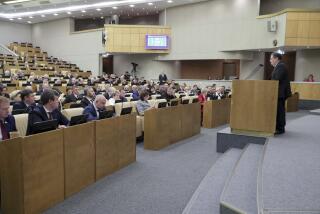Japan’s Defense Budget Will Slip Below 1% of Gross National Product Next Year
- Share via
TOKYO — Japan’s defense budget is set to slip next year below the key level of 1% of gross national product, though actual military spending will rise, Finance Ministry officials said Sunday.
Strong growth of the Japanese economy means a proposed 5.5% increase in 1990-91 defense spending, to $29 billion, will still put it beneath 1% of GNP for the first time in four years.
But the drop back below the controversial defense spending ceiling scrapped by former Prime Minister Yasuhiro Nakasone in 1987 has less to do with thawing East-West tensions than with the booming Japanese economy.
“At this stage, we remain very prudent and cautious (about East-West relations),” one official told reporters.
Nakasone’s decision to scrap the 11-year-old ceiling in 1987, aiming to increase Japanese self-reliance in defense, was criticized by some of its neighbors in Asia who were worried about a possible resurgence of Japanese militarism.
Tokyo’s defense budget is the third biggest in the world, after the United States and the Soviet Union, but that is partly because of high personnel expenses.
The draft budget proposed by the Finance Ministry for the fiscal year beginning in April calls for the 5.5% increase in defense spending, after a 5.9% rise this year. The Defense Agency has asked for a 6.35% increase.
Finance Ministry officials said they rejected many Defense Agency requests for new equipment, including 30 new tanks and a $940-million destroyer with a sophisticated Aegis weapons system. Instead, the proposed budget put more emphasis on improved logistics and support services.
“The Finance Ministry agreed to the minimum budget needed to support an efficient and balanced self-defense force in the final year of the midterm plan,” one ministry official said.
Finance Ministry officials said that spending to help the United States offset the cost of troops stationed in Japan would rise more than 40% next fiscal year, to $320 million.
Strapped with a big budget deficit, Washington has been pressing Tokyo to pick up a bigger share of the tab.
More to Read
Sign up for Essential California
The most important California stories and recommendations in your inbox every morning.
You may occasionally receive promotional content from the Los Angeles Times.












